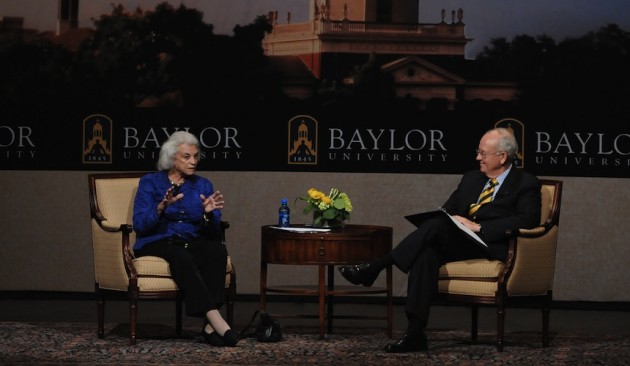Former justice discusses iCivics games, discrimination

Associated Press
Daniel C. Houston
Staff Writer
Sandra Day O’Connor regaled a Baylor audience Monday with the story of her struggle to succeed as a woman in a male-dominated law field, highlighting how the profession has shifted since her selection as the first female U.S. Supreme Court justice.
O’Connor said she faced active discrimination in her attempt to find her first job in law, offering to work for her first employer for no pay because he was the only party interested in hiring her but could not afford to pay her salary. Eventually, through hard work and good fortune, she said she was able to land a salary and develop in her legal career, culminating in former president Ronald Reagan’s decision to nominate her to the Supreme Court.
Dr. Elizabeth Davis, executive vice president and provost, introduced O’Connor and thanked her for her role as a symbol for the expansion of women’s opportunities in the workplace. Davis said she did not have to go through the same difficulties O’Connor did, in large part because of her work.
O’Connor’s remarks were the third in President Ken Starr’s “On Topic” series of discussions with prominent public figures. Past guests have included former U.S. Secretary of State Condoleezza Rice and oil billionaire T. Boone Pickens.

Among other discussion topics, Starr gave O’Connor a chance to advertise her new educational program, iCivics, a series of online games intended to increase student understanding about the structure of American government and the legal rights of citizens.
“When we got public schools in America,” O’Connor said, “it was with the argument that the framers had designed this good new form of government that was ingenious, wonderful, but we have to teach it to all of our citizens so then [they would learn] how this government works. And in the early years, the reason we founded public schools was to teach civics.”
Now, O’Connor said, some states are focusing so narrowly on mathematics and writing that they are cutting civics out of public school curriculum altogether.
But Baylor has partnered with several local schools to implement and research O’Connor’s iCivics program. Starr observed one of the iCivics sessions at a local high school last week, saying he saw the students forge a deeper connection with the government offices they studied through the program.
“[At] Waco High School this last week,” Starr said, “a number of us participated in a classroom observing students, and they were role-playing. They were members of the Congress, they were members of the Senate, they were presidents, they were judges and justices of the Supreme Court, and one of the comments by one of the students was, ‘being president is hard.’”


